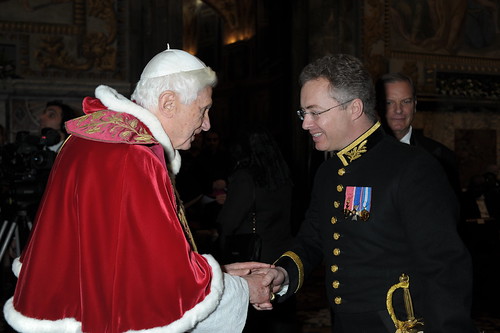9th January 2013
Pope Benedict speaks to the World

As is traditional, earlier this week Pope Benedict XVI received ambassadors from the 179 countries accredited to the Holy See for his New Year’s address on Holy See concerns, interests and recommendations on the main foreign affairs issues of the day.
Behind the pomp and circumstance of one of the great annual events of the Roman Curia, this valuable occasion provides ambassadors with the opportunity to get a feel for the Holy See’s global policy priorities, a chance to network, as well as giving the Holy See the ability to transmit its preoccupations to the world, setting an agenda for 2013.
Pope Benedict’s address delivered, as is traditional, in French, was a tour d’horizon of global issues, reflecting the engagement of the Holy See’s unique network across the continents.
Three broad themes struck me particularly:
- The reminder, through the extent of issues covered, of the Holy See’s global role. Pope Benedict commented pertinently on events in the Middle East, Sub-Saharan and North Africa, parts of Asia, on Europe and Latin America, and on big issues of human rights, freedom of conscience and religious liberty, euthanasia, terrorism, the importance of education to development, and the role of religious dialogue in settling political disputes.
- The message that peace, truth and justice are not and cannot be abstract principles, but need to be made real and require constant effort to uphold. The responsibility for that lies with civil and political authorities, principally at national level. Pope Benedict invoked in particular the appalling carnage in Syria, and the violence in the Democratic Republic of Congo and the Horn of Africa as parts of the world that require us to go the extra mile in the search for peace.
- The need for investment in education and leadership, looking towards the future both in the developing world, and in crisis-ridden Europe; in other words, that we have to tackle the conditions generating poverty or economic crisis if we are to deal with the surface symptoms. And a reminder that there is more to current crises than technical economic issues: in the Pope’s words, we must tackle the “spread” in social well-being – between as well as within countries – as well as the spreads in financial markets.
Much of this dovetails with Britain’s agenda for its Presidency of the G8, that we assumed at the beginning of the year. We are looking forward to exploring with the Holy See just how we can address the Pope’s foreign policy concerns, and working together through our networks on improving governance through transparency, accountability and open government.